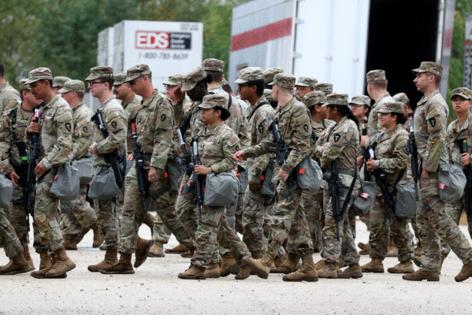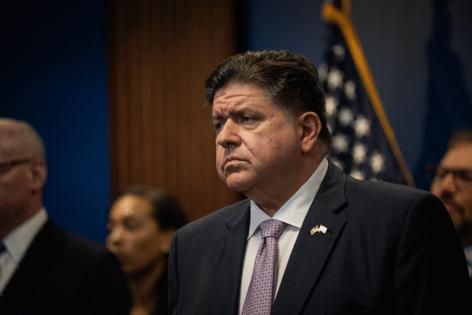Gov. JB Pritzker says President Trump deploying troops to Chicago due to 'dementia' and obsessive fixations
Published in Political News
CHICAGO — In a scathing critique of President Donald Trump, Illinois Gov. JB Pritzker on Tuesday accused the Republican president of deploying National Guard troops to the Democratic cities of Chicago and Portland based on fixations that stem in part from his being mentally impaired.
“This is a man who’s suffering dementia,” Pritzker said in a telephone interview with the Chicago Tribune. “This is a man who has something stuck in his head. He can’t get it out of his head. He doesn’t read. He doesn’t know anything that’s up to date. It’s just something in the recesses of his brain that is effectuating to have him call out these cities.
“And then, unfortunately, he has the power of the military, the power of the federal government to do his bidding, and that’s what he’s doing.”
The governor’s comments came as National Guard troops from Texas were assembling at a U.S. Army Reserve training center in far southwest suburban Elwood and Trump’s administration was moving forward with deploying 300 members of the Illinois National Guard for at least 60 days over the vocal and legal objections of Pritzker and other local elected leaders.
The Trump administration has said the troops are needed to protect federal agents and facilities involved in its ongoing deportation surge and has sought to do much the same in Portland and throughout the state of Oregon, though those efforts have been stymied so far by temporary court rulings. A federal judge in Chicago is expected to hold a hearing this week over the legal effort by Illinois and Chicago to block the deployments, which Pritzker and other local officials say is not only unnecessary but a violation of the Posse Comitatus Act that prohibits the use of U.S. military assets from taking part in law enforcement actions on domestic soil.
During the interview, Pritzker — who has been one of Trump’s harshest critics and is a potential 2028 presidential Democratic candidate — said the courts will play an integral role in challenging Trump’s efforts in Illinois and across the nation.
“We’re not going to go to war between the state of Illinois and the federal government, not taking up arms against the federal government,” Pritzker said. “But we are monitoring everything they’re doing, and using that monitoring to win in court.”
Pritzker also said he has not had any conversations with his staff or other Democratic governors regarding a so-called soft secession, a political and legal theory that has grown during Trump’s second term in which Democratic states would gradually withdraw their cooperation with the federal government, including withholding financial support, without formally leaving the Union.
“Preparing for and going to court with the law on our side and winning in court is important,” he continued. “It is the most important thing that we can do legally. If there are people who are suggesting there are things that we should do that are illegal. I would suggest to you, we’re not going to do those things.”
But even as the governor said he was counting on winning in the courts, Trump was openly exploring options to circumvent them.
Speaking in the Oval Office on Tuesday, the president reiterated that he was considering employing the two-century-old Insurrection Act to get around legal court orders that would deny him the ability to deploy National Guard troops to cities such as Chicago and Portland, Oregon, over governors’ objections.
“It’s been invoked before,” Trump said of the law, which the Brennan Center for Justice said has been used 30 times, starting with President George Washington, to quell the Whiskey Rebellion of 1794.
The Insurrection Act is an exception to Posse Comitatus and allows a president to deploy the military to “suppress rebellion” or “insurrection” when enforcing federal law becomes “impracticable.”
Past Supreme Court rulings have given the president broad discretionary powers to decide if conditions have been met to invoke the Insurrection Act, but it has left the door open for judicial review to determine if a president invoked the law “in bad faith” or in going beyond “a permitted range of honest judgment.” And the actions of the military, once invoked, are also subject to judicial review.
The last time the Insurrection Act was invoked was by President George H.W. Bush during the Los Angeles riots of 1992, with the support of California Gov. Pete Wilson. It also was used in Chicago in 1968 by President Lyndon Johnson to curb rioting over the assassination of the Rev. Martin Luther King Jr. with the backing of Mayor Richard J. Daley and acting Gov. Samuel Shapiro.
But the last time it was invoked over the opposition of a sitting governor was in 1965 when Johnson used it to federalize troops to protect civil rights marchers in Montgomery, Alabama, over the objections of segregationist Gov. George Wallace.
President Dwight D. Eisenhower famously invoked the act in 1957 to order the Arkansas National Guard to stand down from its orders from Gov. Orval Faubus to prevent the segregation of Little Rock’s public schools following the Supreme Court’s Brown v. Board of Education ruling. Eisenhower also deployed the Army’s 101st Airborne Division to protect Black students attending classes.
As Pritzker has sought to counter Trump on nearly every front, he has joined California Gov. Gavin Newsom in threatening to leave the bipartisan National Governors Association because the organization hasn’t spoken out against Trump’s National Guard mobilizations.
In the Tribune interview, Pritzker noted how nearly all 50 state governors at the time signed on to an April 29, 2024, letter to then-President Joe Biden’s administration opposing the military’s push in Congress to forcibly transfer Air National Guard units performing space missions into the U.S. Space Force without the governors’ consent.
Among those who signed were then-GOP South Dakota Gov. Kristi Noem, who now heads the U.S. Department of Homeland Security, overseeing the U.S. Immigration and Customs Enforcement agency and Border Patrol.
“Well, I’m somebody who likes to reach out and do things in a bipartisan fashion, and I’ve attended NGA events and had friendly relationships with some Republican governors in the past, and the NGA has an important role. But not if it’s unwilling to stand up in this moment and speak on behalf of states’ rights the way that it always has,” Pritzker said. “So I don’t know how I can trust that the NGA actually does stand up for the states with Republicans in charge, apparently they’re just going to do Donald Trump’s bidding.”
Pritzker also continued to defend the process and timing of the Illinois attorney general’s office in filing a lawsuit to halt the National Guard activations, which wasn’t filed until Monday, two days after U.S. Defense Secretary Pete Hegseth issued a memo about the Illinois National Guard deployments. This is despite Pritzker and Attorney General Kwame Raoul knowing for weeks that Trump had threatened to send the military to the streets of the Chicago area.
“You have to understand legal proceedings. In order for you to bring a lawsuit of any sort, you have to have what’s called ripeness. It has to be ripe. That means there has to be some action that’s taken to demonstrate that the wrong is being effectuated,” said Pritzker, calling any questions about the timing of the suit “a false avenue to follow.” “Just because someone says they’re going to call out the National Guard to do this in Illinois, until they do, you can’t file suit.”
_____
©2025 Chicago Tribune. Visit chicagotribune.com. Distributed by Tribune Content Agency, LLC.



























































Comments